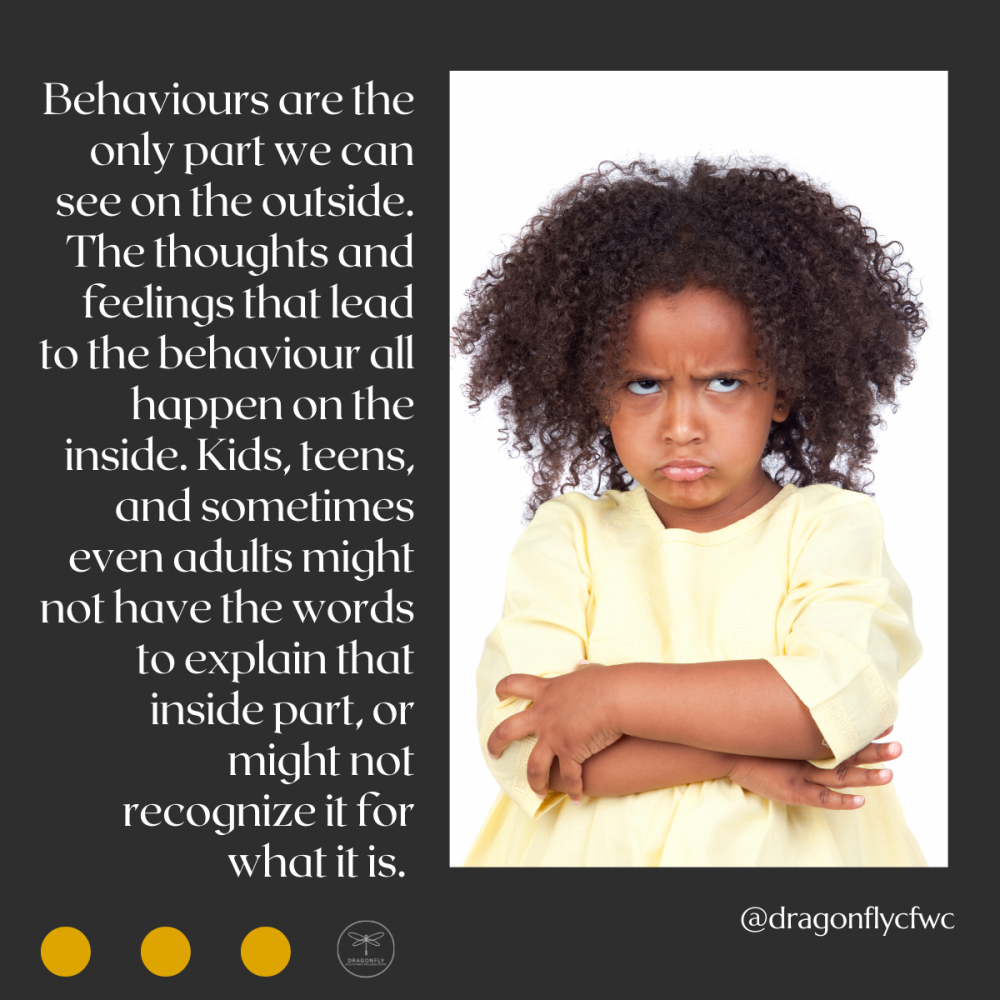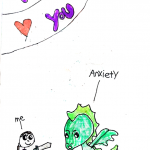Children's Behaviour - The Inside and The Outside

Behaviours are the only part we can see on the outside. The thoughts and feelings that lead to the behaviours all happen on the inside. You might be thinking that this statement does not seem like rocket science, however it is often at the centre of challenges that families face when dealing with a child’s difficult behaviour. Kids, teens, and even adults might not always recognize what exactly they are feeling on the inside, or they might not have the words to express it.
One of our counsellors has a personal story that illustrates this idea. When her daughter was about four she would have meltdowns every morning before daycare. She would complain that her clothes were too tight, too itchy, that her boots weren’t on her feet right, and so on. Our thoughtful counsellor went out and bought her clothing that was looser and softer. She would try and help her readjust her boots. But nothing seemed to help.
After a while, she started to notice that her daughter could wear the same clothing just fine in the evening after daycare and on weekends. This was her clue that these issues might be related to some worries or a general feeling of anxiety about going to daycare that day rather than an actual sensitivity to her clothing. I think we can all relate to this sensation especially on Sunday nights or Monday mornings before starting a new work week. Unlike adults though, kids are new to the world and new to all those feelings and sensations that are swirling around inside. Instead of recognizing that they are feeling bothered or worried about going to daycare, they might truly believe that the problem is in their clothing.
Once our counsellor recognized this she made a plan. One evening just like a detective, she stated her observation and her theory “hmm I notice your clothes aren’t bothering you right now, but they were really bugging you this morning. I’m wondering if you might be feeling worried or bothered when it’s time to go to daycare in the morning, and it’s making you feel bugged about your clothes” Her daughter wasn’t sure, so they agreed to pay attention the next morning. The next morning when her daughter started her usual meltdown about her clothing our clinician reminded her “hmmm… I’m wondering if you might be feeling worried or bothered about going to daycare today”. Her daughter had to think for a minute before responding “yes, I miss you when I go to daycare”. Her mom validated those feelings “yes I understand that feeling, I miss you too when I’m at work”, and then gave her some helpful thoughts “even though you might miss me, I’ve noticed that you also have a lot of fun with your friends at daycare, sometimes you don’t even want to leave at the end of the day”. Her daughter didn’t immediately respond to this, and she didn’t immediately stop having meltdowns about her clothing. But over the next few weeks, she started talking more about her feelings and blaming it less on her clothing. After another few weeks she started to say some of her own helpful thoughts out loud “it’s ok to miss you, and I know I feel better once we start circle time in the morning”. She slowly started to recognize the feeling of anxiety and could express it verbally in other situations as well.
Sometimes caregivers can feel stuck or unsure of what exactly is causing the behaviour. It’s easy for caregivers to see the behaviour at face value rather than recognizing all the internal processes that happen to result in a behaviour. Sometimes talking with a counsellor can help. There is no specific type of behaviour that has to be going on to see a counsellor – if the behaviours are causing difficulties in the day-to-day life of a child or a family then counselling can be helpful. Parents don’t need to know what exactly the problem is either, counselling with kids is a lot like a group of detectives (kids, caregivers, and the counsellor) solving a mystery together.


